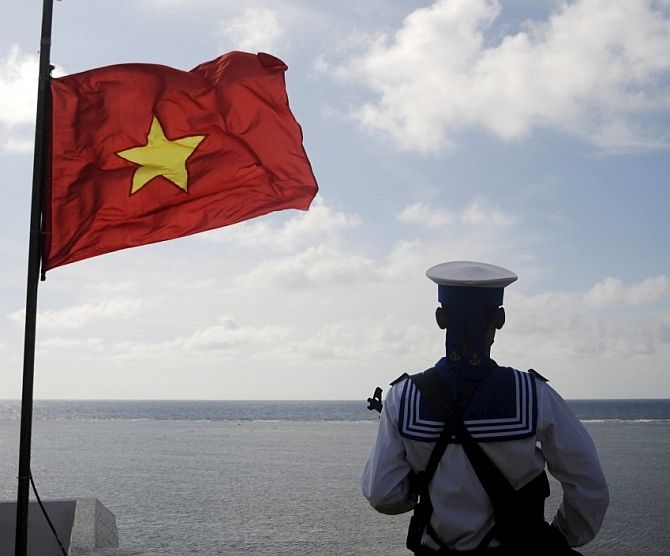A United Nations-backed international tribunal on Tuesday struck down China's claims of "historical rights" in the strategic South China Sea, prompting Chinese President Xi Jinping to reject its ruling and asserting that Beijing will not accept the verdict "under any circumstances".

Xi's strong remarks came immediately after The Hague- based tribunal dismissed the core of China's claims over the 90 per cent South China Sea, ruling that "there was no legal basis for China to claim historic rights within the sea areas falling within the 'nine-dash line'", which is based on a Chinese map dating back to the 1940s.
In his meeting with European Council President Donald Tusk and European Commission President Jean-Claude Juncker, President Xi, also the General Secretary of the ruling Communist party and commander-in-chief of the military, said China's territorial sovereignty and maritime interests in SCS will not be affected by the ruling under any circumstances.
Xi's comments indicates China's tough stand on the ruling by the five judge tribunal appointed by the Permanent Court of Arbitration which struck down Beijing's controversial nine- dash line on the SCS claiming over 90 per cent of the area.
China "neither accepts nor recognises" the ruling of the tribunal in the SCS arbitration established at the request of the Philippines, the Chinese foreign ministry said in Beijing.
"The award is null and void and has no binding force," it said in a statement minutes after the tribunal delivered its judgement striking down Beijing's claims of historic rights over the area, strongly disputed by the Philippines, Vietnam, Malaysia, Brunei and Taiwan.
China's territorial sovereignty and maritime rights and interests in the SCS shall under no circumstances be affected by those awards. China opposes and will never accept any claim or action based on those awards, the statement quoted by state-run Xinhua new agency said.
The tribunal concluded that "to the extent China had historic rights to resources in the waters of the SCS, such rights were extinguished to the extent they were incompatible with the exclusive economic zones provided for in the Convention" (UN Convention on the Law of Seas), it said.
"The tribunal also noted that, although Chinese navigators and fishermen, as well as those of other States, had historically made use of the islands in the SCS, there was no evidence that China had historically exercised exclusive control over the waters or their resources," it said.
For decades China, which boycotted the tribunal questioning its legality has been asserting that its emperors have discovered the islands hundreds years ago and have been exercising control over the area throughout the history.
But is claims came into conflict with the Philippines, Vietnam, Malaysia, Brunei and Taiwan as they hardly have exclusive economic zones provided by UNCLOS which Beijing declined to recognise.
While the Philippines filed the case in 2013, Beijing's claims over the SCS are also contested by Vietnam, Malaysia, Brunei, Taiwan and Indonesia as well.
Xi said that China has always been a guardian of international rule of law and of fairness and justice, and will always adhere to the path of peaceful development.
"China is firmly committed to peace and stability in the South China Sea, and to settling the disputes with countries directly involved, through peaceful negotiations based on the recognition of historical facts and in accordance with international law," the President said.
Scientists believe that the seabed of the SCS could contain unexploited oil, gas and minerals. Major shipping lanes vital to world trade pass through the SCS, carrying raw materials, finished products, as well as huge quantities of oil and gas.
Ahead of the verdict, the US had asked China to learn from India's handling of its maritime disputes with its neighbours.
In 2014, the same court that gave verdict on the SCS -- ruled against India in favour of Bangladesh in a three-decade- old maritime dispute. To India's great credit, it accepted the decision and has abided by it.
As the concerns over the verdict rose in Beijing, specially its international impact, the Chinese military which is building its installations on the artificial islands asserted that it will "resolutely protect" Beijing’s sovereignty over the area, where the US navy has made big inroads.
Yang Yujun, spokesman for the ministry of national defence, said that Chinese military will resolutely protect the country's national sovereignty, security and maritime rights and interests, and will address threats and challenges.
"The position of the Chinese government on the SCS arbitration initiated by the Philippines is consistent and clear," Yang said, stressing that no matter how the tribunal decides, Chinese military will resolutely protect its national sovereignty, security and maritime rights and interests; safeguard regional peace and stability; and cope with all kinds of threats and challenges.
Responding to questions on the Chinese navy's recent drills in the SCS, Yang said that the drill was a routine matter in line with the military's annual exercise plan.
Yang said that the drill, seen as a muscle flexing by China ahead of the tribunal verdict, targeted potential situations at sea and was a live-fire test to boost the navy's capabilities to fulfil missions.
Hours before the tribunal delivered its verdict, foreign ministry spokesman Lu Kang said China will not even officially receive the judgment of the tribunal as it has no legal basis.
"It is true that we do not recognise and accept the so-called arbitration. We will have no legal connection with the arbitral tribunal and we will not accept what ever materials it provides", he told a media briefing replying to questions whether China will receive a copy of the verdict.
Lu warned warned that China will resort to "solemn response" against anyone challenging its stand with the award.
"If any one challenges China's interests by siding with the award of the arbitration then China will take solemn response," he said without elaborating.
Meanwhile, police in Beijing sealed off the area around the Philippines Embassy building with heavy deployment amid speculation of demonstrations to protest Manila's decision to opt for arbitration. Similar demonstrations were held against Japan over the disputed islands in the East China Sea.
The disputes in the SCS and with Japan have become rallying points to arouse national sentiments by the ruling Communist Party of China in recent years. The "nine-dash" line is printed in all the Chinese passports.
The Philippines issued an advisory to its nationals based in China not to discuss the SCS verdict and avoid arguments.
In its verdict, the tribunal was emphatic that its judgement is binding despite China's rejection.
"The Award is final and binding, as set out in Article 296 of the Convention and Article 11 of Annex VII," said the summery of the judgement sent to media in Beijing by PCA in the form of a press release.
The tribunal also held that the SpratlyIslands, which China claims as NanshaIslands, "cannot generate maritime zones collectively as a unit.
"Having found that none of the features claimed by China was capable of generating an exclusive economic zone, the tribunal found that it could -- without delimiting a boundary -- declare that certain sea areas are within the exclusive economic zone of the Philippines, because those areas are not overlapped by any possible entitlement of China."
It slammed China for causing harm to marine environment.
"The tribunal considered the effect on the marine environment of China's recent large-scale land reclamation and construction of artificial islands at seven features in the Spratly Islands and found that China had caused severe harm to the coral reef environment and violated its obligation to preserve and protect fragile ecosystems and the habitat of depleted, threatened, or endangered species," the PCA verdict summery said.
"The tribunal also found that Chinese authorities were aware that Chinese fishermen have harvested endangered sea turtles, coral, and giant clams on a substantial scale in the
South China Sea (using methods that inflict severe damage on the coral reef environment) and had not fulfilled their obligations to stop such activities," it said.
"The tribunal considered whether China's actions since the commencement of the arbitration had aggravated the dispute between the Parties," it said.
"The arbitration is a political farce under the pretext of law," said Chinese Foreign Minister Wang Yi.
"The unilateral initiation of arbitration by the Philippines is out of bad faith. It aims not to resolve the relevant disputes between China and the Philippines, or to maintain peace and stability in the SCS, but to deny China's territorial sovereignty and maritime rights and interests in the SCS," the foreign ministry statement said.
It further said that China stands ready to continue to resolve the relevant disputes peacefully through negotiation and consultation with the states directly concerned on the basis of respecting historical facts and in accordance with international law.
"The Chinese government reiterates that, regarding territorial issues and maritime delimitation disputes, China does not accept any means of third party dispute settlement or any solution imposed on China," it said.











 © 2025
© 2025